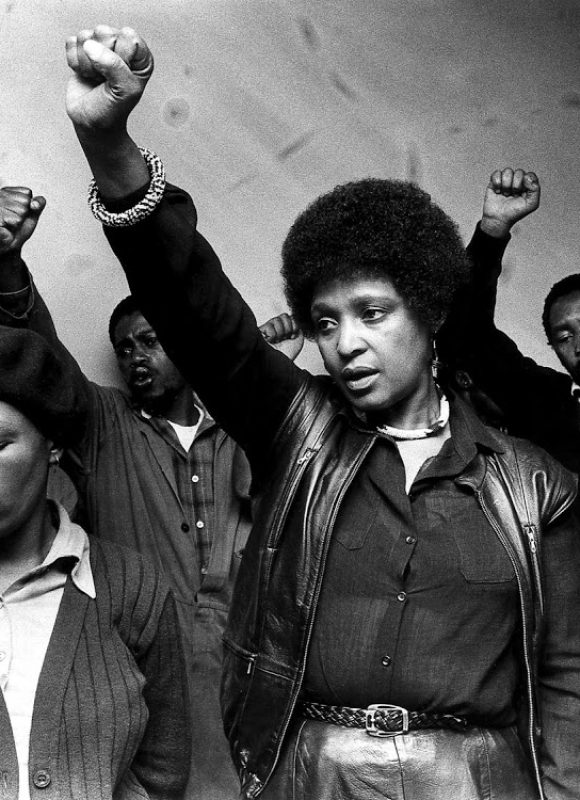PIONEER
Winnie Madikizela-Mandela

ANC member | Politician | Human Rights Activist
Born: 26 September 1936. Died: 2 April 2018.
“It is only when all black groups join hands and speak with one voice that we shall be a bargaining force which will decide its own destiny. This is the only way in which we shall manifest our oneness.”
Who is
Winnie Madikizela-Mandela?
Anti-apartheid activist, African National Party (ANC) member, and social worker.
Professions
and Roles
Social worker, ANC activist, and politician.
Best Known For
Political activism against the apartheid regime, controversial political figure after being implicated in the violence of the Mandela United Football Club (MUFC).
Life highlights
- In 1953, Madikizela-Mandela moved to Johannesburg to study social work at the Jan Hofmeyr School of Social Work – where Nelson Mandela was a patron.
- After graduating in 1955, she took on a position as a medical social worker at Baragwanath Hospital.
- In 1958, Madikizela-Mandela took part in a mass action mobilising women to protest against the apartheid pass laws. She was arrested with 1 000 other women and spent two weeks in prison, even while pregnant. Shortly thereafter, she was fired from her social worker position.
- In 1965, she was issued with a more severe banning order, which further limited her movements and barred her from moving outside of Orlando West, Soweto. She had to give up her job as a social worker, and any employers who considered her were intimidated until she could not find any employment. She would eventually send her children away to Swaziland.
- Madikizela-Mandela continued to be active, organising assistance for political prisoners. In 1969, her home was raided and she was arrested under the Terrorism Act and kept in solitary confinement for 17 months. She was put on trial in December 1969, and her release was finally secured the following year.
- In 1973, she was arrested again for meeting with Peter Magubane, who was also a banned person. She was handed a 12-month sentence to be served at Kroonstadt women’s prison. She was released after six months.
- In 1976, Madikizela-Mandela and Dr Nthato Motlana established the Soweto Parents’ Association and they attended to youth and parents who had been arrested, injured, or killed during the 16 June riots. Madikizela-Mandela was detained as the police blamed her for the violence behind the riots – she was released after five months without charge and served a new banning order.
- In 1977, Madikizela-Mandela was banished by the government to a town in the Free State. She would spend eight years there, establishing a garden collective, a soup kitchen, mobile health unit, day care, and an organisation for orphans and juvenile delinquents.
- In 1986, she returned to Johannesburg and established the MUFC to bring youth together. The MUFC became embroiled in conflict in the years following, and stories emerged about kidnappings, assaults, and torture at their hands.
- After Nelson Mandela’s release from prison in 1990, he appointed Madikizela-Mandela to the ANC’s head of Social Welfare that year.
- In 1990, she stood trial for the murder of 14-year-old James Seipei (also known as Stompie Seipei), alongside members of the MUFC. She was cleared of murder, but sentenced to five years in prison for kidnapping and as an accessory to assault. After an appeal, she was only served a two-year suspended sentence.
- In 1992, Madikizela-Mandela and Nelson Mandela separated. She would resign from all her positions in the ANC shortly thereafter.
- Madikizela-Mandela served as the head of the ANC Women’s League (ANCWL) for two short stints at the end of 1993 and then again in 1997.
- In 1997, Madikizela-Mandela appeared before the Truth and Reconciliation Commission (TRC), which judged her to have been implicated in a number of assaults and murders carried out by MUFC.
IN THE WORDS OF OTHERS
“In the whirlwind of events following Mandela’s release from prison and the start of negotiations designed to ensure a peaceful transition rather than a bloodbath in South Africa … no one bothered to find out what Winnie needed and wanted, how her life had changed or what her aspirations might be … From the moment she was implicated in the serious crimes involving the football club, it was as though her entire past had been erased from the public mind.”
– Anne Marie du Preez Bezdrob, In “Winnie Mandela: A Life”
“In my formative years as a black woman she was one of the women I looked up to with admiration. When I was at Wits University I had the privilege to see her and she was one person who represented a source of hope. We felt safe on campus as Mama Winnie was around.”
– Lebo Ramafoko, CEO of the Soul City Institute
“She refused to be bowed by the imprisonment of her husband, the perpetual harassment of her family by security forces, detentions, bannings and banishment. Her courageous defiance was deeply inspirational to me, and to generations of activists.”
– Archbishop Desmond Tutu, Nobel Peace Prize laureate
https://disa.ukzn.ac.za/sites/default/files/pdf_files/spe19760600.032.009.281.pdf
https://www.soulcity.org.za/news-events/news/mama-winnie-madikizela-mandela2019s-feminist-legacy-lives-on
https://www.soulcity.org.za/news-events/news/mama-winnie-madikizela-mandela2019s-feminist-legacy-lives-on
